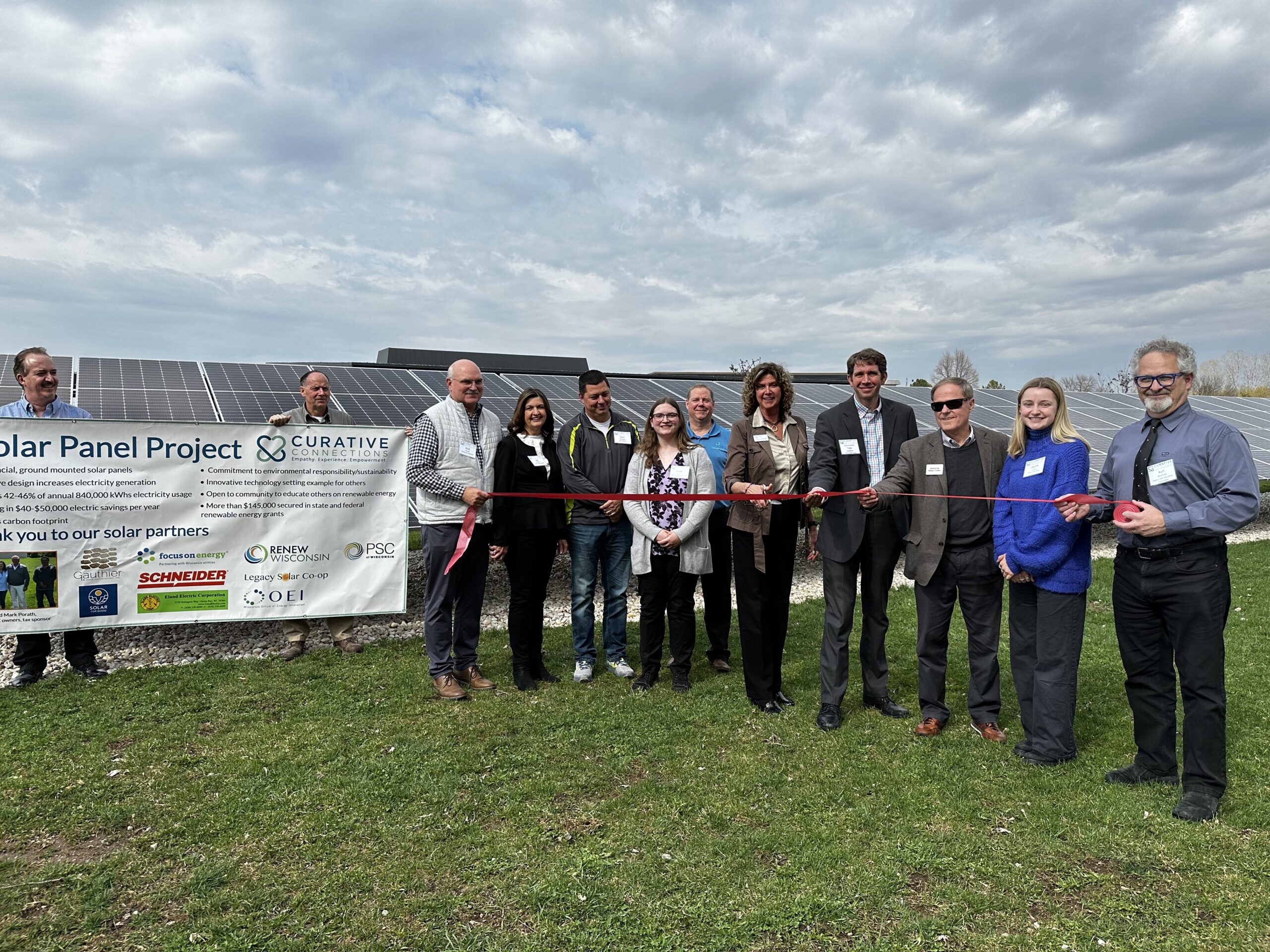
by Lauren Cohen | Apr 24, 2023 | Press Release, Solar, Solar for Good
On Thursday, April 20, Curative Connections held a ceremony dedicated to their new 280-kilowatt solar array. Curative Connections aims to help people reach their goals for independence by providing essential services to older adults and those with disabilities.
This solar system was installed by Eland Electric and is projected to offset 42-46% of the organization’s electricity usage. “We had a great experience with this project, from design and engineering all the way to commissioning,” said Jesse Michalski, Project Manager at Eland Electric. “This project was a little unique in that we had limited space and were trying to maximize the energy output of a solar array, and through the use of bi-facial modules, we were able to achieve a design that fits the customer’s goals.”
The economic implications of this array for Curative Connections are wide-reaching. The newly installed solar array is projected to bring the organization $50,000 of annual savings. “As a nonprofit, this is critical as we can now redirect these savings to support for our programs and the thousands of members
we serve each year,” said Jeanne Stangel, President and CEO of Curative Connections.
This solar installation is momentous as the organization celebrates an impressive milestone. “Curative Connections is proud to cut the ribbon on our solar project as it shines light upon another reason to celebrate our 75th anniversary year,” continued Stangel.
The project was funded largely by a $125,000 Office of Energy Innovation grant and financial support from Focus on Energy. Curative Connections also received a $10,000 grant from Solar for Good, a RENEW Wisconsin program run in partnership with the Couillard Solar Foundation.
“This solar project is a testament to the power of partnership between mission-driven nonprofits and clean energy advocates,” said Lauren Cohen, Program Coordinator with RENEW Wisconsin. “Solar for Good’s success is a direct result of organizations like Curative Connections leading the way towards a more sustainable future for Wisconsin and beyond.”
In addition to their grant funding, Curative Connections worked with Legacy Solar Cooperative to partner with a tax sponsor to take advantage of tax credits, which were not yet available to nonprofit organizations at the time of installation.
“We are grateful for the support we received from foundations, federal and state grants, and community partners,” continued Stangel. “This is a collaborative effort of a commitment to environmental responsibility and sustainability.”
With 75 years of serving the public under their belt, the money saved from this solar installation will allow Curative Connections to continue its mission to ensure that everyone receives the care they deserve. This project demonstrates the organization’s commitment to this mission and the environment, which others can look to and hopefully be inspired to embark on a similar path.
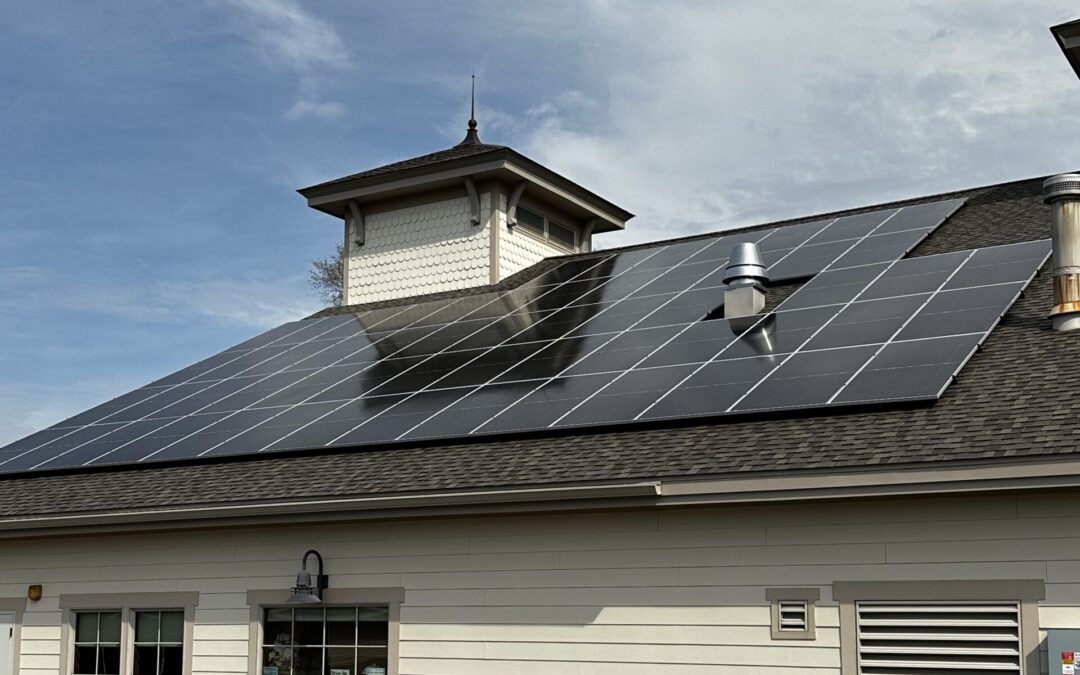
by Lauren Cohen | Apr 17, 2023 | Press Release, Solar, Solar for Good
On Saturday, April 15, the Shirley M. Wright Memorial Library held a solar dedication ceremony for their 32-kilowatt, newly constructed solar array. Scenically located on the Mississippi River and the bluffs of the Driftless Region, the Shirley M. Wright Memorial Library is dedicated to serving the rural communities of Trempealeau by offering free and equitable access to lifelong learning and enrichment.
The project, installed by Ethos Green Power, consists of 60 solar panels and is projected to offset 100% of the library’s electric needs. “This investment will save thousands in tax dollars that can be repurposed for other community needs,” said Alicia Leinberger of Ethos Green Power Cooperative. “In just a few years, the savings will offset the initial investment, providing decades of free electricity harvesting sunshine on the library roof.”
The library received over $83,000 in grants and incentives to install this solar array. Among these, the Shirley M. Wright Memorial Library received an EBSCO Solar Grant, a program that funds library solar installations.
The Shirley M. Wright Memorial Library was also awarded a panel grant from Solar for Good, an initiative provided by RENEW Wisconsin and the Couillard Solar Foundation to expand solar power within the state. The grant provided 30 of the 60 solar modules necessary for the project. “The solar grants and incentives we received will help the library purchase less power generated by fossil fuels, allowing our library to be financially and environmentally sustainable, all while acting as a catalyst to inspire change in the community,” said Jessica Schoonover, Library Director.
The library has laid out several opportunities for the community to interact with and be inspired by this solar array. “The very visible solar panels and the monitoring available on the website make it easy for the public to get curious,” continued Leinberger.
This solar installation will be an example to the Trempealeau community, showing its residents the economic and environmental benefits of adopting sustainable practices. It is just one aspect of a new initiative the library is adopting called SWML Renew, aimed at beginning sustainable, energy-conserving changes to its footprint. “We are working on doing our part to develop, model, educate, and encourage our community to live mindfully of our environment,” continued Schoonover. “We hope to encourage our neighbors to consider energy-efficient ways they can Renew their homes and businesses to make a more resilient future for Trempealeau.”
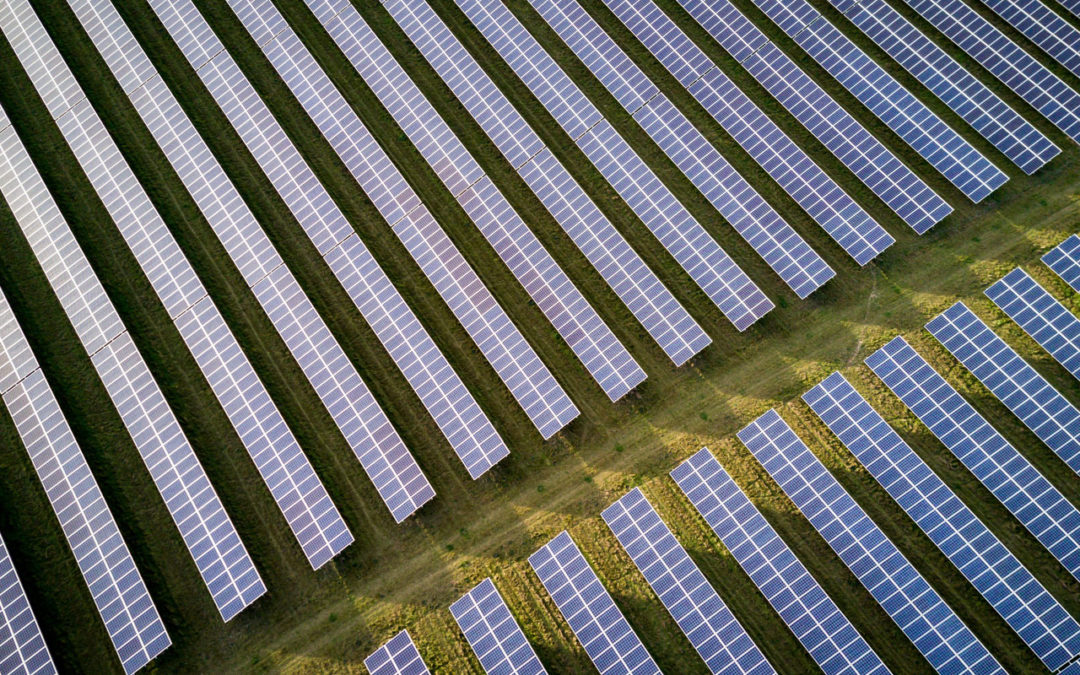
by Michael Vickerman | Apr 6, 2023 | Action Alert, Advocacy, Public Service Commission, Solar, Utility Scale
Langdon Mills Solar is a 200-megawatt solar project with a 50 MW battery energy storage system proposed for development in the Towns of Courtland and Springvale in Columbia County, Wisconsin. As designed, Langdon Mills Solar would generate homegrown, affordable, emission-free electricity sufficient to power the equivalent of approximately 30,000 homes. If approved, construction on Langdon Mills will begin in 2024 and is anticipated to be operational in 2026. For more information, visit the application here. If you want to learn more about how Langdon Mills Solar has engaged with the community, check out their website here. RENEW Wisconsin submitted testimony in support of Langdon Mills Solar in Docket 9818-CE-100, which you can access here.
Solar projects larger than 100 megawatts must gain approval from the Public Service Commission of Wisconsin (PSCW) before they can proceed to construction. Along the way, there are opportunities for public comment at the township, county, and state levels.
Please help us demonstrate Wisconsin’s enthusiastic support for solar power and this project by submitting a comment supporting Langdon Mills Solar. Be sure to specifically reference the project and the benefits that it can bring to Wisconsin. The deadline for submitting comments is May 23, 2023.
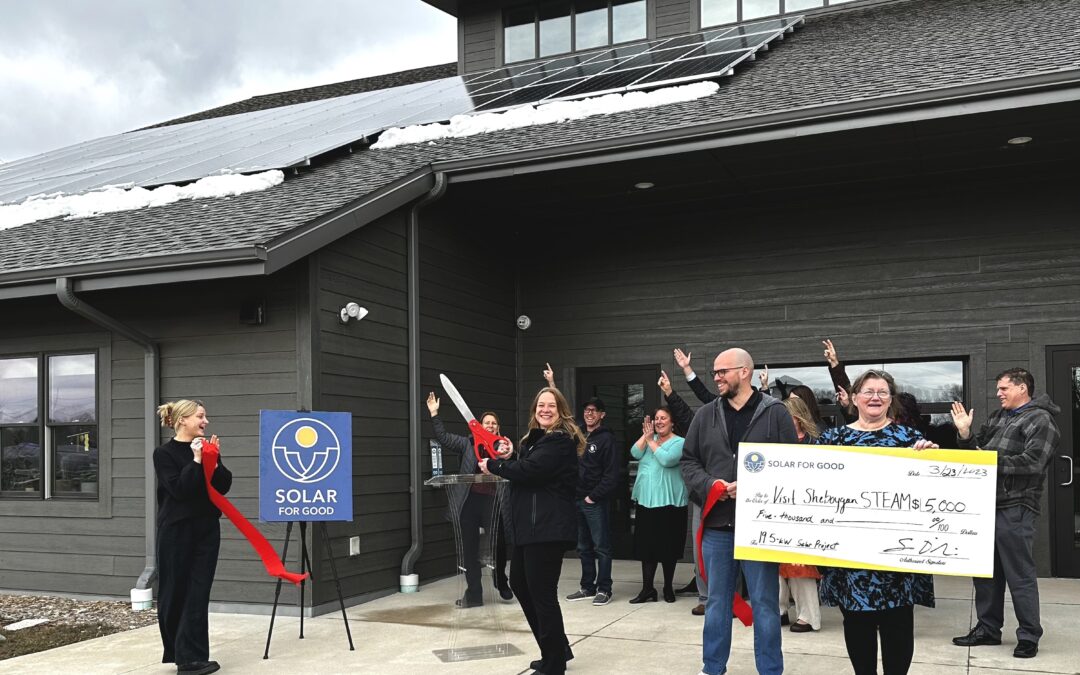
by Lauren Cohen | Mar 24, 2023 | Solar, Solar for Good
On Thursday, March 23, Visit Sheboygan STEAM held a ribbon-cutting ceremony for their 19.5-kilowatt solar array. Visit Sheboygan STEAM is a nonprofit organization that provides innovative science, technology, and urban ecology education.
The project, installed by Arch Solar, consists of 52 solar panels and is projected to offset approximately 28% of the building’s electrical needs and 56% of Visit Sheboygan STEAM’s production. “We had a blast working with Visit Sheboygan STEAM on their solar installation,” said Andrew Holmstrom at Arch Solar. “Installing on such a river-visible location, in downtown Sheboygan, meant a lot of Arch.”
Visit Sheboygan STEAM’s provides environmental and urban ecology education, and those involved with the STEAM program are excited by the solar installation’s educational opportunities. “The mission of our organization includes environmentally focused STEAM education, and this project will help us facilitate a new line of programming featuring photovoltaics and renewable energy,” said Kathy Cannistra, Program Developer at Visit Sheboygan STEAM.
As a popular destination among locals and tourists, Visit Sheboygan STEAM’s solar installation is a role model for similar organizations to follow in their footsteps. “All of Sheboygan County is in the early adoption stages of solar, so influential organizations paving the way are crucial in its development,” continued Holmstrom. “As time goes on, and the STEAM program grows, we’re looking forward to getting involved and providing education to the leaders of tomorrow on clean energy.”
This project was primarily funded by the organization’s existing donor base and business sponsors. In addition, RENEW Wisconsin’s Solar for Good program provided Visit Sheboygan STEAM with a $5,000 grant to assist with the upfront cost of the solar array.
“Environmental stewardship and education are core to our mission,” continued Cannistra. “Therefore, we are thrilled that this solar project has helped reduce the energy-related costs of our STEAM (Science, Technology, Engineering, Art, Math) programming while simultaneously demonstrating that solar power can be effective in our climate and region.”
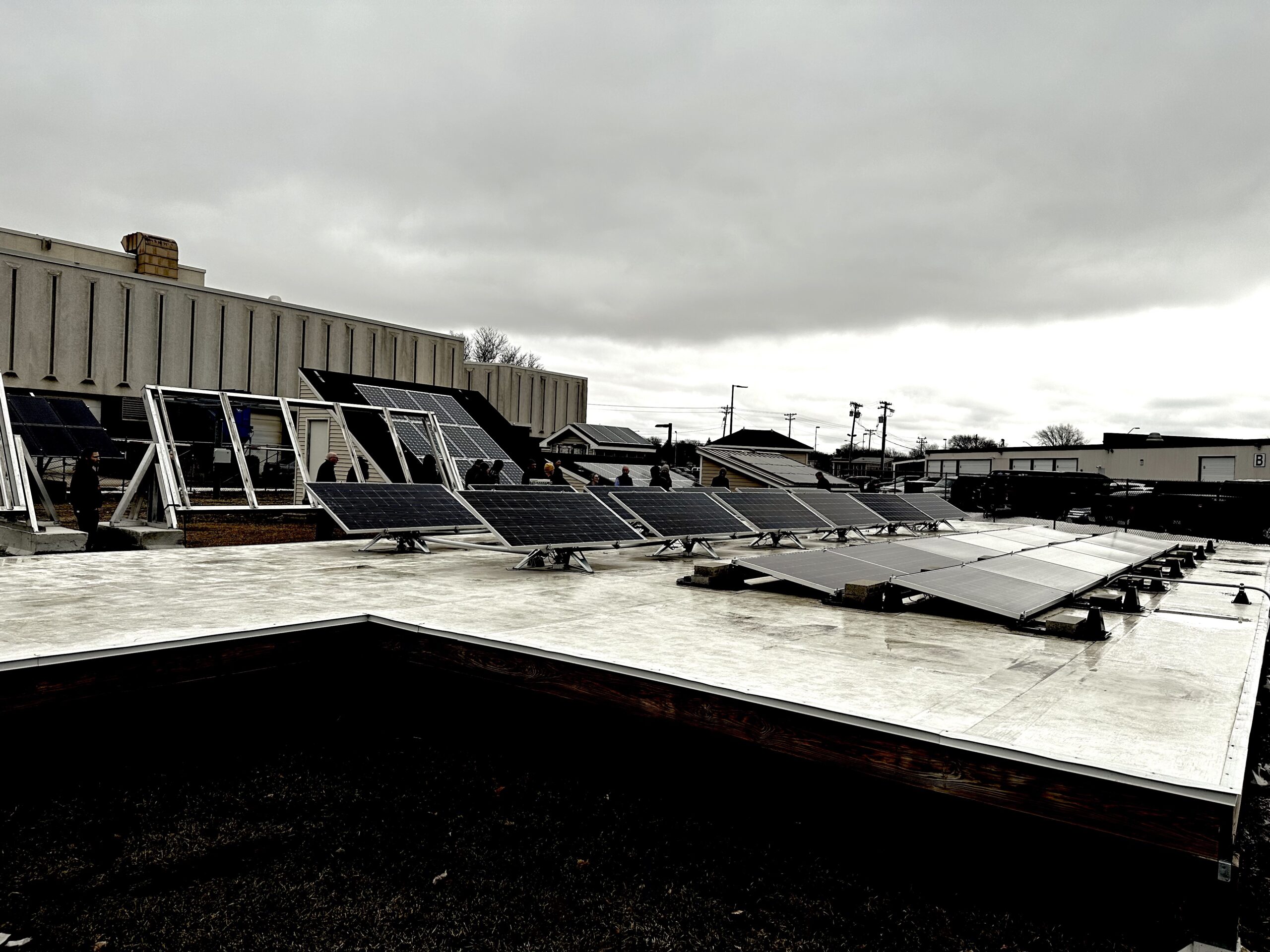
by Lauren Cohen | Mar 24, 2023 | Events, Programs, Solar
On February 7, 2023, and March 2, 2023, RENEW Wisconsin and
Midwest Renewable Energy Association (MREA) hosted two Solar Workforce Training Courses at Madison Technical College as part of the MadiSUN Solar Energy Program.
MadiSUN is the City of Madison’s solar program administered by RENEW Wisconsin.
Solar installer is one of the fastest-growing jobs in the United States. Madison has a robust solar market, and solar installers struggle to find enough qualified employees. In response to this need, RENEW Wisconsin crafted a solar workforce initiative that had two primary goals:
1. To increase the number of qualified, trained workers in our community that local solar contractors could utilize to expand the total solar capacity installed in Madison.
2. To increase family-supporting careers within communities of color and low-income communities in the City of Madison.
To fulfill these goals, RENEW Wisconsin partnered with MREA instructors to host two “Solar 100” training sessions. These classes were each a one-day (8-hour) course that introduced participants to solar photovoltaic (PV) technology and workplace safety.
The course catered to those interested in a career in solar but unsure where to begin. It provided participants with many basic skills necessary for a career in the solar industry, making them more appealing to solar installation companies.
In the future, RENEW is working to find additional opportunities for participants of the Solar 100 class to take advanced training to obtain full North American Board of Certified Energy Practitioners (NABCEP) certification. While NABCEP certification is not needed to become a solar energy professional, it gives individuals more opportunities to further their careers.
Thank you to the City of Madison, MREA, and the students who made this initiative a success. We hope to provide more training opportunities in the future to advance clean energy in Wisconsin.

by Michael Vickerman | Mar 23, 2023 | Action Alert, Advocacy, Public Service Commission, Solar, Utility Scale
Elk Creek Solar is a 300-megawatt solar project with a 76.6 MW battery energy storage system proposed in the Township of Springbrook in Dunn County, Wisconsin. As designed, Elk Creek Solar would supply homegrown, affordable, emission-free electricity to power the equivalent of approximately 60,000 homes. If approved, Elk Creek will begin producing clean power by the end of 2025. For more information, visit the application HERE. If you would like to learn more about how Elk Creek Solar is engaging with the community, check out their website HERE. If approved, Elk Creek will begin producing clean power by the end of 2025. RENEW Wisconsin submitted testimony in support of Elk Creek Solar, which you can access HERE.
Solar projects larger than 100 megawatts must gain approval from the Public Service Commission of Wisconsin (PSCW) before they can proceed to construction. Along the way, there are opportunities for public comment at the township, county, and state levels.
Please help us demonstrate Wisconsin’s enthusiastic support for solar power in general and this project in particular by submitting a comment in support of Elk Creek Solar. Be sure to specifically reference the project and the benefits that it can bring to Wisconsin. The deadline for submitting comments is May 12, 2023.





